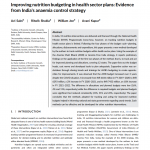
The Increasing Problem of Private Sector Corruption
14 June 2019
The suggestions I mentioned in my last blog on how to reduce corruption in the Registration Department, which registers deeds and documents relating to transactions in land and other immovable property, were based on a simple application of the Klitgaard formula. This was: Corruption equals Monopoly plus Discretion, minus Accountability.
However, I also said that even if our suggestions were implemented, they would not have worked. This is because the crowdsourced reports that we read, revealed that the techniques followed by corrupt departments had become more sophisticated and less easy to detect and prove.
In earlier, simpler times, catching the corrupt when they were engrossed in the act, were spectacular and entertaining events. The anti-corruption squad would visit a corruption prone office unannounced and hell would break loose. Officers and staff would be caught red faced, with their pockets and desk drawers filled with bank notes. Things that would fit straight into an uproarious comedy movie would ensue; officers desperate not to be caught with their loot, have been known to flush money down the toilet or throw them out of the windows. However, today, if surprise raids were to be held, the chances of catching the corrupt with ill gotten money is remote.
Corruption has found a new partner; people in the private sector. And they are not going to be caught, if the law continues to be what it is now.
Let me give an example of what I mean by a public private partnership in corruption. Let’s get back to the problem of house registration. It is an open secret that when a builder sells a flat, he also ‘arranges’ for a smooth registration of the property. A ‘facilitation fee’ is charged; often by another name, such as ‘legal drafting charges’ or ‘lawyers fees’, for services such as drafting a sale deed for the property. The buyer is intimated formally to make payment, which she may do through cheque or an online transaction, with the builder. On the appointed day, the buyer goes to the sub-Registrar’s office and the sale transaction is done promptly, by polite and courteous staff. All of this looks squeaky clean and the conscientious buyer may even be satisfied that no bribes have been paid for the sale.
But here is the catch. It is the builder who picks up the bribe, on behalf of the officers. Payments are then channelised to the officers, or their agents, or to the ultimate, often political, mastermind of the operation.
Woe betide the buyer who wants to outsmart such arrangements. Some of them, quite canny, have refused to pay the facilitation fee and attempted to have the property registered on their own. Builders try to discourage them, and if they fail, they comply with the request of buyers to register the property sullenly. On a couple of cases where I intervened on behalf of property owners who refused to step into the trap laid down for them by builders, it was seen that the latter not only were uncooperative, but even resorted to threats and misleading predictions that the buyer would run into serious trouble if he did not pay the ‘facilitation fee’.
Similar arrangements of private sector players acting as bribe collection agents for public servants, exist across a wide range of government services. Car dealers act on behalf of officials of the transport department, electricity civil contractors on behalf of the power utility, and so on.
How can such a thing happen? The root cause is that as it stands today, private sector corruption is not entirely criminalised. The Prevention of Corruption Act, even after recent amendments to it, largely applies to corruption by public servants. This is in sharp contrast to anti-corruption laws in many other countries, which criminalises corruption by the private sector.
Let us look at what one would consider to be within a commonsensical definition of corruption, in the private sector. I reckon that there are four kinds of private sector corruption. The first category comprises corruption within corporates and private sector entities, such as departments within private organisations demanding and accepting bribes. Examples are of employees that cheat on their travel bills paying a cut to the accounts department to clear their false bills, or new recruits paying the HR department for their appointment letters.
The second category of private sector corruption happens between corporates. For example, a kickback may be paid to procurement officials by a vendor. The third category of private sector corruption is the phenomenon of professional corruption, for example, unethical and corrupt practices by lawyers, chartered accountants and medical practitioners. The fourth category is the corruption that happens between corporates and governments, of the kind that one explained earlier, which happens in the Registration Department.
In India, recent amendments to section 9 of the Prevention of Corruption Act has criminalised private sector bribing of public servants. Section 9 states that if any person associated with a commercial organisation gives or promises to give any undue advantage to a public servant to obtain or retain business or an advantage in conduct of business, he commits the act of corruption.
While this is indeed a welcome amendment, it is not sufficient to counter the rising threat of private sector corruption.
This blog is part of a series. The first blog can be found here.





